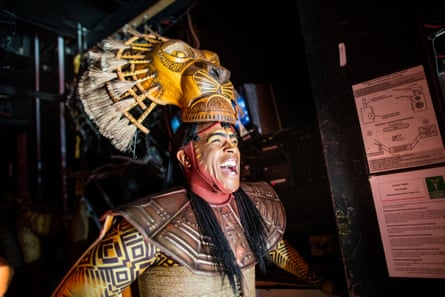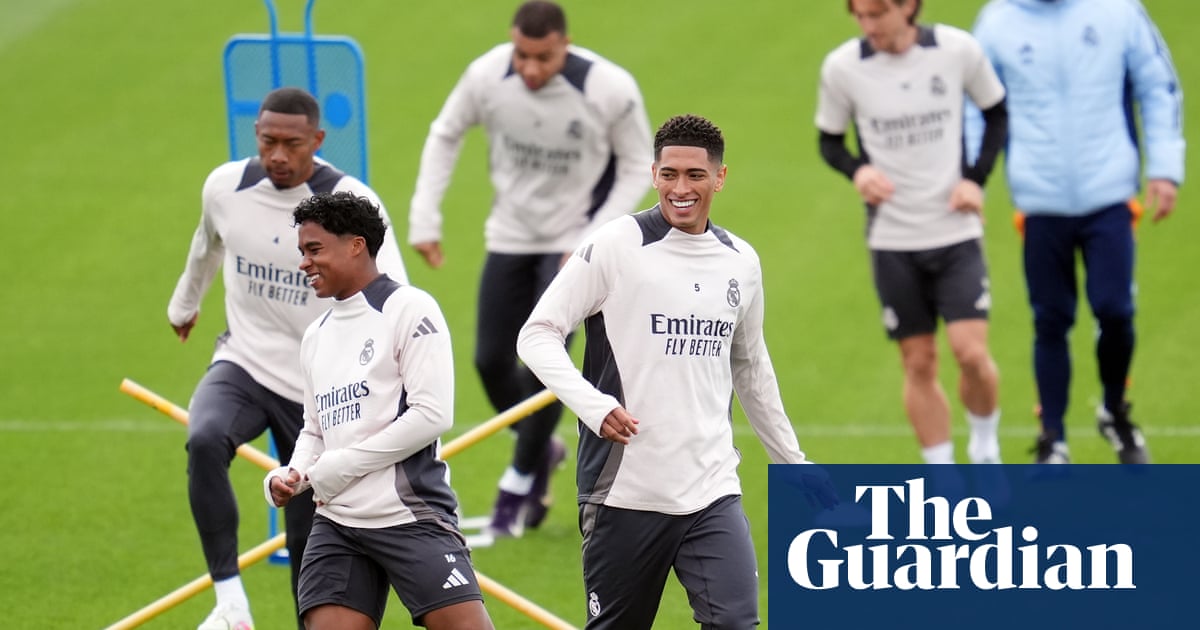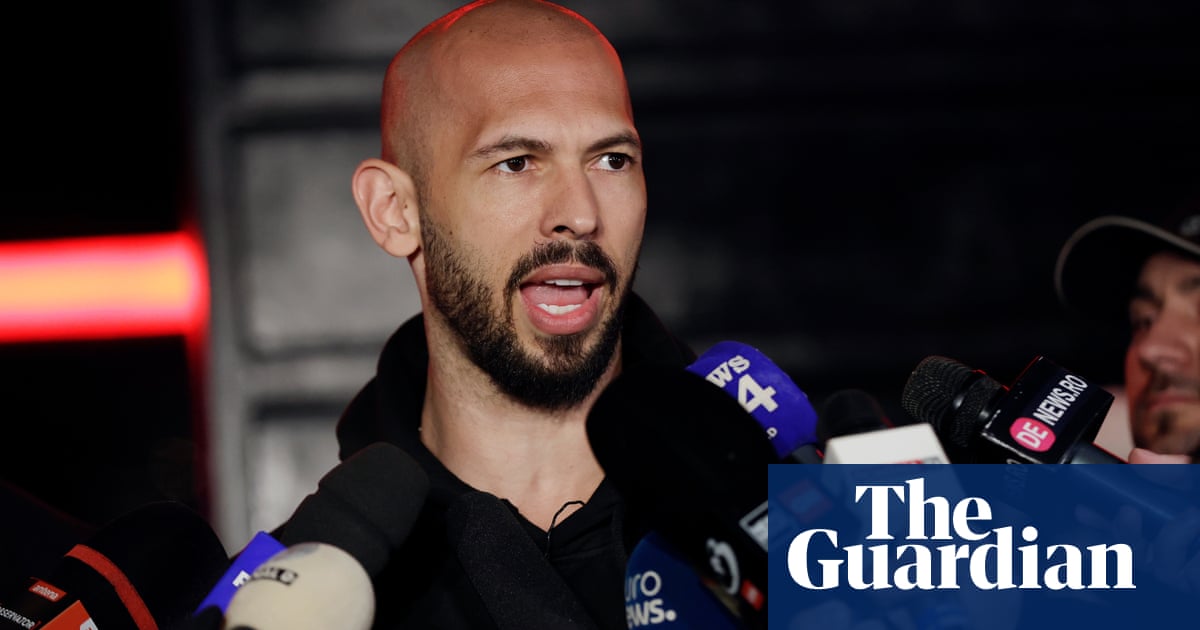‘I thought I’d do a year and leave,” says Sara Poyzer, who played mother Donna in the Abba musical Mamma Mia! “But the things I gained outweighed the things I lost.” She ended up staying in the part for an entire decade, even performing in front of two Abba members and at the show’s 20th anniversary, before leaving in January 2024.
Among all the glitzy new openings in London’s West End, there are a sturdy cohort of shows that seem to have just always been there. Audiences still seem to be delighted by The Lion King, now in its 26th year, and other long-running hits – but what’s it like for the actors like Poyzer, who play the same part seven or eight times a week, year after year? Does it become a groundhog day on the boards? And how do they keep their performances – and the shows – fresh?
Strangely, all the repetition and routine actually gave Poyzer a sense of creative freedom. “You say the lines in a certain order, stand in a certain spot, and all those things. But once they’re in place, I feel free.” She infused the role with aspects of her own character to keep Donna energised. “I have always taken my experience into my performance. So if I was feeling particularly emotional, a song might be a more emotional piece of storytelling that night. If I was pissed off, I’d be more fiery. I felt there was enough licence to be able to tell the story afresh.”
It is important to understand that no two performances in a show’s run are ever the same, says Sean Jones, who has starred in Willy Russell’s musical Blood Brothers, in the West End and on tour since 1999. “There is always one new cast member and that’s the audience,” he says. “If you’re paying attention to them, you know you’ve got a different show on your hands every night. For example, we’ve just had a school audience in, which requires a different tack. If I start sobbing and snotting my way through the emotional scenes, it can make a teenager uncomfortable.”

As you become more intimate with your character, they take on new depths, thinks Shaun Escoffery, who has played The Lion King’s benevolent king of the jungle for a whopping 17 years. “Mufasa is such a complex, multilayered character,” he says. “He’s a king, a warrior, a husband, a father, a brother to his arch-enemy. He’s deeply spiritual and open-hearted, but also a ferocious lion.”
To have to encompass all of those qualities felt overwhelming at first, he says, but the part has evolved with him. “I’ve grown up playing the role. During that time, I got married, I had children, and that’s changed me as a man. So I’ve tried to implement being a father, being a husband and having a depth of spirituality into the character. It’s been a real epiphany for me.”
Complacency is the enemy for Escoffery, not least because it risks letting down the audience and cast: “To become static or think, ‘I’ve got this’, is a very dangerous place to be.” He has an internal trigger to get himself ready for his role afresh. “I call it my on and off switch. It doesn’t matter how I’m feeling – I have to switch it on. That keeps me on my toes.”
Jack Baldwin has been in the immersive show Faulty Towers: The Dining Experience for 13 years, playing beleaguered hotelier Basil. Baldwin never tries to replicate John Cleese’s performance in the original sitcom – nor his own from the night before: “That would be a museum piece.”
The show requires lots of improvisation, which helps make each night different. “There’s a script, which is the spine of the show, but a lot of it is about turning to people and eliciting a response. You rehearse the fight choreography and the scripted bits but there are chunks where we are instructed to interact with the audience.”
There is always an injection of fresh energy when a new cast member arrives. “I’ve had a lot of different co-stars,” says Jones, who in Blood Brothers plays Mickey, separated at birth from his twin, Eddie. “Every new Linda [Mickey’s friend] or Mrs Johnstone [his mother] is going to bring something different out in me. I feel like I am rediscovering the show again.”

Poyzer says she “can be slightly mischievous” on stage. “It’s amazing the amount of fire it can add.” She has just appeared in Come From Away and says: “Most of the cast were really playful. There was a moment when I’m meant to flirt with a character. I grabbed his lapels and pulled him towards me – which I’d never done before. I could sense him coming alive. I saw it in his eyes.”
Striving for the best, most perfect version of her own performance is a constant challenge: “I have sometimes come off stage and thought, ‘That was brilliant. I want to do that tomorrow.’ I have chased that, thinking, ‘What did I do?’ and ‘How did I achieve that?’ Or, ‘Why did I not do it tonight?’ It’s almost mathematical.”
Escoffery finds himself shifting his intentions, from performance to performance. “For example, I reflect on what Mufasa was thinking before his son Simba came, before he met the lioness Sarabi, before he became the king of the Pride Lands. What was his history?” George Asprey, who plays baddie Scar, joined The Lion King at the same time: “We know each other very deeply and keep each other accountable,” says Escoffery. “So if we feel a little bit of a lull, or there’s a lapse in our performance, we pull each other up.”

Long-running shows can become family affairs. Jones met his (now former) wife, actor Tracy Spencer, on Blood Brothers and they toured as a family. His 15-year-old daughter, an aspiring actor, now wants a part. Poyzer was in Mamma Mia! with her actor-husband Richard Standing, who is still in the show. They have performed it around the world together.
A long-running show, says Poyzer, can put enormous pressure on a voice. “You’re going to get fatigue, so you have to really take care of it, particularly when you’re singing repetitiously. It’s about readjusting your vocal cords and all the parts of your anatomy you use when you’re singing to constantly make sure it’s optimum.”
Escoffery keeps to a highly disciplined exercise routine. “The show is very physical. I have to train, I have to go to the gym, I have to eat right. You won’t last otherwise.” In Blood Brothers, Jones plays Mickey as a child. Now that the actor is 52, he gets “more aches and bruises” but adds: “I find the energy because I love doing it. But there used to be a scene where Mickey would run on and leap over a sofa. About five years ago I was getting pain in my legs from that, so now I just run across the stage, which has the same kind of impact.”
While the shows have largely stayed the same, the actors have noticed changes in their audiences. Faulty Towers was one of the first immersive shows and the form was little understood, even by Baldwin at first. People are more comfortable with the interaction now, he says. With Mamma Mia! there was a growing sense of ownership over the show following the success of the film, starring Meryl Streep as Donna. “A sense that this is ours, we know it, we’ve got the DVD.”
Do they think they’ll all be in their roles for decades yet? Baldwin, for one, does not anticipate putting in another 13 years. “I don’t think I could do it physically,” he says. “I’d feel like I was cheating people if I couldn’t do certain movements that people want to see. The goose-step is the big one!”
Jones left Blood Brothers twice but was pulled back. “I still loved it as much,” he says. “I still wanted to discover it as much – and I also like the touring lifestyle. Once upon a time, I would probably just have joined the circus.”
Although Poyzer left Mamma Mia! to tour in Come From Away, she would love to return to Donna. “I’d like to play her again with all the experience, personal and professional, that I would bring to the role. I went to a restaurant last week in Italy. They were chatting about Mamma Mia! and made me sing The Winner Takes It All. I thought, ‘Oh my gosh, I’ve never sung it like that before.’”

.png) 1 day ago
7
1 day ago
7













































